Ethnic groups
- Arabs
- Baggara
- Bagirmi
- Fula
- Buduma
- Maba
- Hausa
- Fur
- Haddad
- Kanembu
- Kanuri
- Borno
- Kim
- Lisi
- Masalit
- Sara
- Toubou
- Tupuri
- Moussei
- Masa
- Hadjerai [1]
- Kotoko [1]
- Peuvu
(Indented entries in the list are subdivisions of the main entry above them.)
This is a list of ethnic groups in Chad.
(Indented entries in the list are subdivisions of the main entry above them.)

The people of Chad speak more than 100 languages and divide themselves into many ethnic groups. However, language and ethnicity are not the same. Moreover, neither element can be tied to a particular physical type.
The Chad National Army consists of the five Defence and Security Forces listed in Article 185 of the Chadian Constitution that came into effect on 4 May 2018. These are the National Army, the National Police, the National and Nomadic Guard (GNNT) and the Judicial Police.
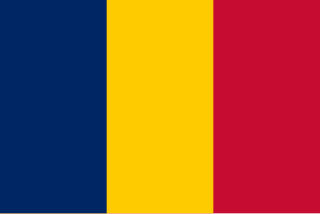
Chad, officially the Republic of Chad, is a landlocked country located at the crossroads of North and Central Africa. It is bordered by Libya to the north, Sudan to the east, the Central African Republic to the south, Cameroon to the southwest, Nigeria to the southwest, and Niger to the west. Chad has a population of 16 million, of which 1.6 million live in the capital and largest city of N'Djamena. With a total area of around 1,300,000 km2 (500,000 sq mi), Chad is the fifth-largest country in Africa and the twentieth largest nation by area in the world.

François Tombalbaye, also known as N'Garta Tombalbaye, was a Chadian politician who served as the first President of Chad from the country's independence in 1960 until his overthrow in 1975. A dictatorial leader, his divisive policies as president led to factional conflict and a pattern of authoritarian leadership and political instability that are still relevant in Chad today.

Idriss Déby Itno was a Chadian politician and military officer who was the 6th president of Chad from 1991 until his death in 2021 during the Northern Chad offensive. His term of office of more than 30 years makes him Chad's longest-serving president.
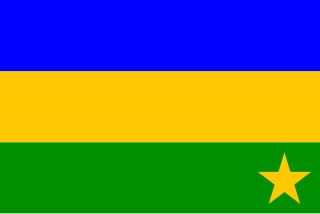
The Kanuri people are an African ethnic group living largely in the lands of the former Kanem and Bornu Empires in Niger, Nigeria, Chad, and Cameroon, as well as a diaspora community residing in Sudan. Those generally termed Kanuri include several subgroups and dialect groups, some of whom identify as distinct from the Kanuri. Most trace their origins to ruling lineages of the medieval Kanem–Bornu Empire, and its client states or provinces. In contrast to the neighboring Toubou or Zaghawa pastoralists, Kanuri groups have traditionally been sedentary, engaging in farming, fishing the Chad Basin, trade, and salt processing.
Kim may refer to:
The Zaghawa people, also called Beri or Zakhawa, are an ethnic group primarily residing in southwestern Libya, northeastern Chad, and western Sudan, including Darfur.
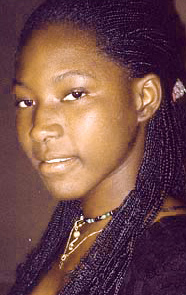
The Sara people are a Central Sudanic ethnic group native to southern Chad, the northwestern areas of the Central African Republic, and the southern border of North Sudan. They speak the Sara languages which are a part of the Central Sudanic language family. They are also the largest ethnic group in Chad.

The Toubou or Tubu are an ethnic group native to the Tibesti Mountains that inhabit the central Sahara in northern Chad, southern Libya, northeastern Niger, and northwestern Sudan. They live either as herders and nomads or as farmers near oases. Their society is clan-based, with each clan having certain oases, pastures and wells.

The Banda people are an ethnic group of the Central African Republic. They are likewise found in the Democratic Republic of the Congo, Cameroon, and South Sudan. They were severely affected by slave raids of the 19th century and slave trading out of Africa. Under French colonial rule, most converted to Christianity but retained elements of their traditional religious systems and values.

The Chadian Civil War of 2005–2010 began on December 18, 2005. Since its independence from France in 1960, Chad has been swamped by civil wars between the Arab-Muslims of the north and the Sub-Saharan-Christians of the south. As a result, leadership and presidency in Chad drifted back and forth between the Christian southerners and Muslim northerners. When one side was in power, the other side usually started a revolutionary war to counter it.
The Buduma are an ethnic group of Chad, Cameroon, and Nigeria who inhabit many of the islands of Lake Chad. They are predominantly fishers and cattle-herders. In the past, the Buduma carried out violent raids on the cattle herds of their neighbors. They were feared villains with aggressive reputations; thus, they were respected and left alone for many years, protected by their own habitat of water and reeds.

The 2004 Chadian coup d'état attempt was an attempted coup d'état against the Chadian President Idriss Déby that was foiled on the night of May 16, 2004.

Chad–United States relations are the international relations between Chad and the United States.
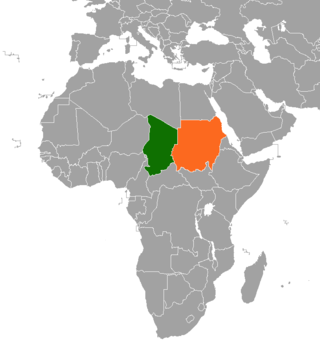
The populations of eastern Chad and western Sudan established social and religious ties long before either nation's independence, and these remained strong despite disputes between governments. In recent times, relations have been strained due to the conflict in Darfur and a civil war in Chad, which both governments accuse the other of supporting.
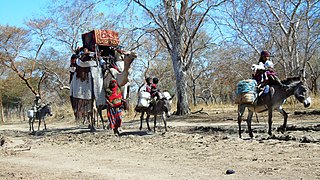
The population of Chad has numerous ethnic groups. SIL Ethnologue reports more than 130 distinct languages spoken in Chad.
The Kujarke people are a little-known ethnic group of the Ouaddaï Region in eastern Chad and South Darfur, Sudan. They speak Kujargé, a divergent, unclassified Afro-Asiatic language. Their current population and locations are unknown due to the war in Darfur. Furthermore, they have not been previously recorded as a separate ethnic group by any government or foreign aid organization.